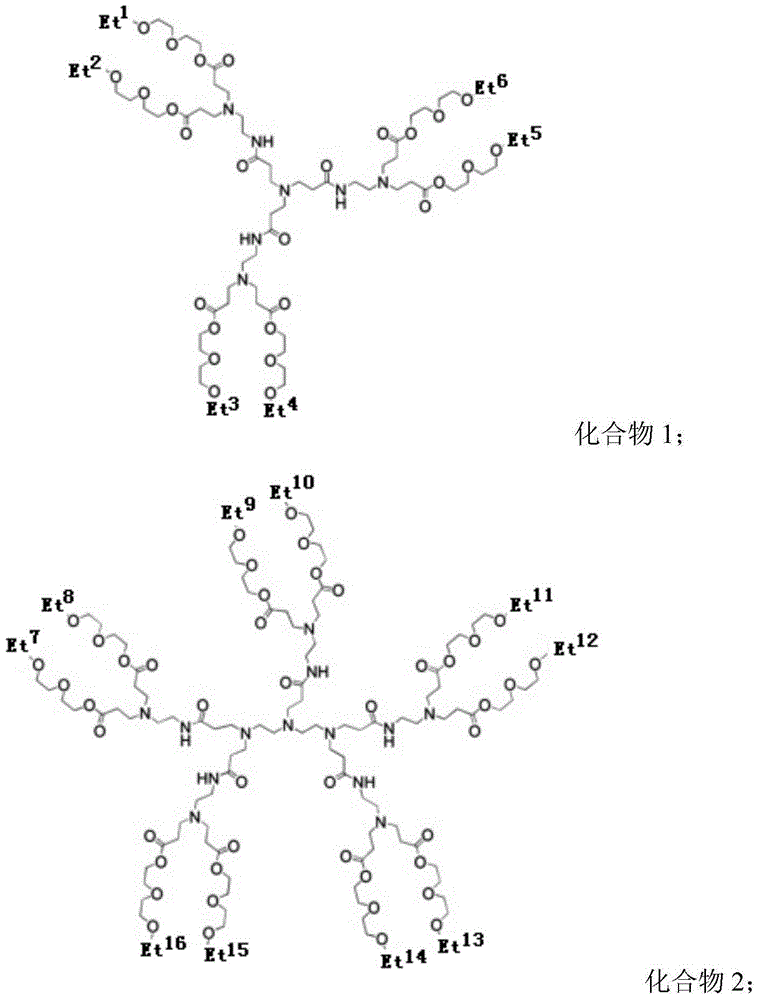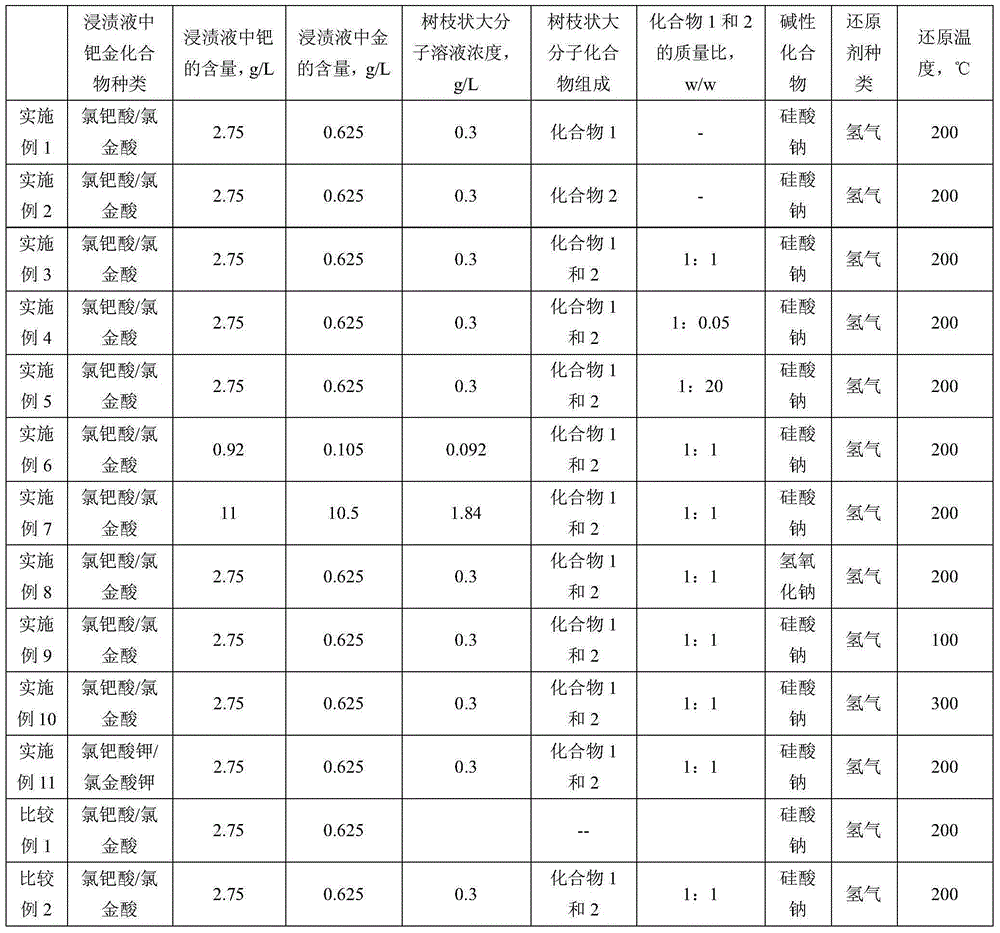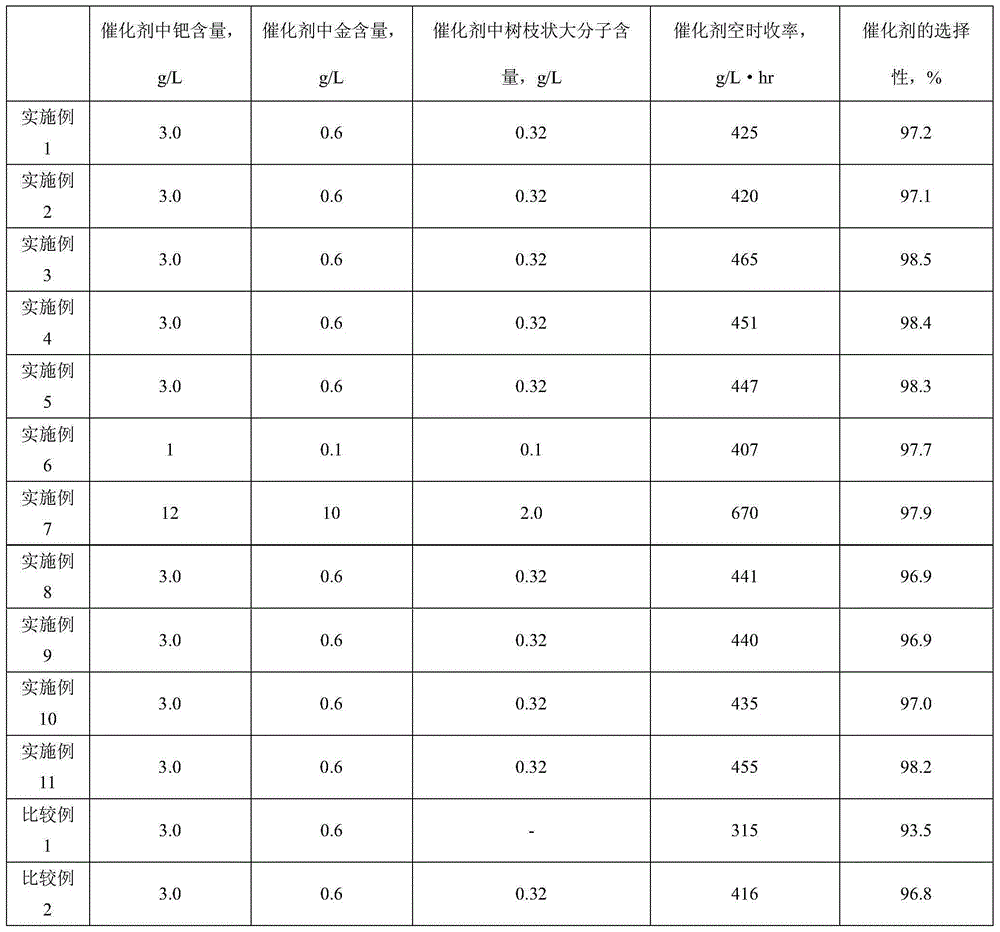Vinyl acetate catalyst and preparing method thereof
A vinyl acetate and catalyst technology, applied in the field of vinyl acetate catalysts and its preparation, can solve the problems of low activity and selectivity of vinyl acetate catalysts, and achieve the effects of increased selectivity, good technical effects, and increased active sites
- Summary
- Abstract
- Description
- Claims
- Application Information
AI Technical Summary
Problems solved by technology
Method used
Image
Examples
Embodiment 1
[0030] (1) Catalyst preparation
[0031] Step (a): get 1200ml of mixed aqueous solution of chloropalladic acid and chloroauric acid, wherein the content of palladium in the solution is 2.75g / L, and the content of gold is 0.625g / L, and adding a volume of 1100ml of spherical carbon dioxide with a diameter of 4 to 6mm Silicon carrier, obtains catalyst carrier I;
[0032] Step (b): 27.5g of sodium silicate nonahydrate was formulated into 100ml of aqueous solution and added to catalyst precursor I, mixed uniformly, left standing for 24hr, and then dried at 80°C for 8hr to prepare catalyst precursor II;
[0033] Step (c): Take 1200ml of a solution containing compound 1 with a concentration of 0.12g / L, add catalyst precursor II for impregnation, and obtain catalyst precursor III;
[0034] Step (d): reducing the catalyst precursor III in a hydrogen atmosphere, the hydrogen flow rate is 0.2ml / min, the pressure is 0.5MPa, and the reduction temperature is 200°C to obtain the catalyst pr...
Embodiment 2
[0049] (1) Catalyst preparation
[0050] Step (a): get 1200ml of mixed aqueous solution of chloropalladic acid and chloroauric acid, wherein the content of palladium in the solution is 2.75g / L, and the content of gold is 0.625g / L, and adding a volume of 1100ml of spherical carbon dioxide with a diameter of 4 to 6mm Silicon carrier, obtains catalyst carrier I;
[0051]Step (b): 27.5g of sodium silicate nonahydrate was formulated into 100ml of aqueous solution and added to catalyst precursor I, mixed uniformly, left standing for 24hr, and then dried at 80°C for 8hr to prepare catalyst precursor II;
[0052] Step (c): Take 1200ml of a solution containing compound 2 at a concentration of 0.12g / L, add catalyst precursor II for impregnation, and obtain catalyst precursor III;
[0053] Step (d): reducing the catalyst precursor III in a hydrogen atmosphere, the hydrogen flow rate is 0.2ml / min, the pressure is 0.5MPa, and the reduction temperature is 200°C to obtain the catalyst precu...
Embodiment 3
[0057] (1) Catalyst preparation
[0058] Step (a): get 1200ml of mixed aqueous solution of chloropalladic acid and chloroauric acid, wherein the content of palladium in the solution is 2.75g / L, and the content of gold is 0.625g / L, and adding a volume of 1100ml of spherical carbon dioxide with a diameter of 4 to 6mm Silicon carrier, obtains catalyst carrier I;
[0059] Step (b): 27.5g of sodium silicate nonahydrate was formulated into 100ml of aqueous solution and added to catalyst precursor I, mixed uniformly, left standing for 24hr, and then dried at 80°C for 8hr to prepare catalyst precursor II;
[0060] Step (c): Take 1200ml of a solution containing compound 1 and compound 2 at a concentration of 0.12g / L, wherein the mass ratio of compound 1 and compound 2 is 1:1, add catalyst precursor II for impregnation to obtain catalyst precursor III;
[0061] Step (d): reducing the catalyst precursor III in a hydrogen atmosphere, the hydrogen flow rate is 0.2ml / min, the pressure is 0...
PUM
| Property | Measurement | Unit |
|---|---|---|
| diameter | aaaaa | aaaaa |
Abstract
Description
Claims
Application Information
 Login to View More
Login to View More - R&D
- Intellectual Property
- Life Sciences
- Materials
- Tech Scout
- Unparalleled Data Quality
- Higher Quality Content
- 60% Fewer Hallucinations
Browse by: Latest US Patents, China's latest patents, Technical Efficacy Thesaurus, Application Domain, Technology Topic, Popular Technical Reports.
© 2025 PatSnap. All rights reserved.Legal|Privacy policy|Modern Slavery Act Transparency Statement|Sitemap|About US| Contact US: help@patsnap.com



